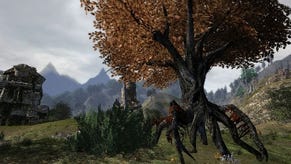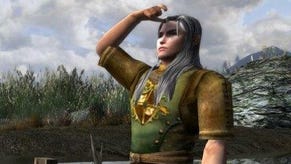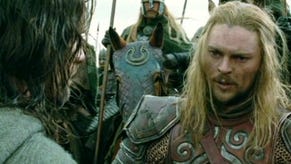The Lord of the Rings Online: Mines of Moria
Dungeon calling.
A blade to call my own
There's a greater innovation elsewhere in Mines of Moria, however - and one that seems an assured success. The item advancement system that gives Legendary items their own progression paths - with experience, attributes, customisation options and even specific quests - is an appallingly detailed and ruthlessly clever new obsession for LOTRO players. Mindful of its audience of solo and small-group adventurers, Turbine has forged a fascinating solo endgame, and the strongest link yet between an MMO character and its kit.
Legendary items are characterised as the relics of Moria, although crafters can make them too. They come in two flavours - weapons and the new "class items", for example a Champion's battle-horn - are always specific to one class, and each character can possess up to five. Weapons get experience from kills and specific quests, and level up; lower-quality ones you'll find at level 50 have a cap of level 10, but the best Legendaries can progress to 30 or even higher.
To begin with, you'll need to take the weapon to a Runeforge to have it identified and expose its Legacies - the attributes it has that modify your character's skills. These are all rated from bronze to gold, and each has its own progression path through a series of ranks; gold Legacies aren't just better, they have more ranks, but you might choose a weapon with all silver Legacies if they suit your play style better. Effectively talents, you'll need to spend points out of a limited pool to choose these Legacies, but every 10 levels the weapon stops gaining experience and needs to be reforged - this increases its power and also gives you a chance to rebuild its Legacy specialisation.
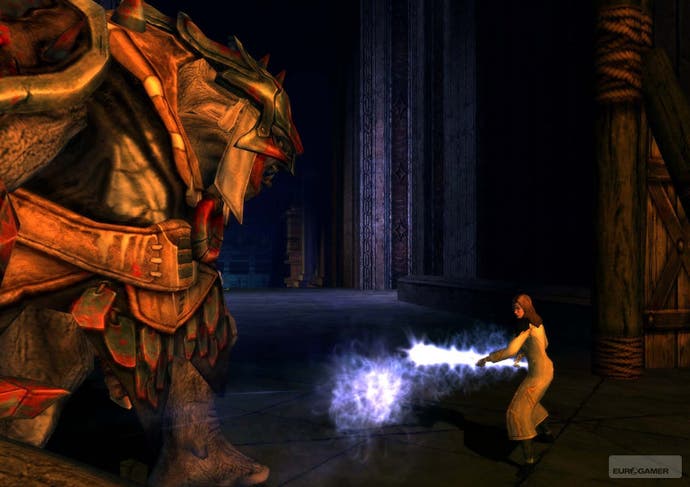
Not complicated enough for you? Try this. Every item advancement weapon has three slots for Relics (one each for settings, gems and runes), which provide the sort of inherent stat modifiers of more standard gear. Relics are obtained by deconstructing other Legendaries that you decide you don't want to keep; once equipped, they can be over-written, but not removed. Relic-masters provide a random chance to convert lesser-used relics into something more useful, and crafters will be able to make relics too. Mercifully, Turbine allows you to carry an infinite number of Relics without using bag space.
Item advancement is at once a bewilderingly and mouth-wateringly deep system. Finding, levelling and tuning a perfect set of five Legendaries - not to mention getting Deeds to change their names and titles - is bound to become an overriding urge for all LOTRO players. Item advancement blows the typical end-game pursuit of the finest gear wide open. This is very smart stuff; our only concern is finding the right balance between tuning the Legendaries you have and creating new ones, since if new Legendaries come too thick and fast, it could devalue them, and deflate your sense of pride and personal connection with this special new species of RPG loot.
Trait me right
Oddly, this extreme depth of customisation is something Turbine has avoided in its character classes so far, as it replaced traditional talent trees with a simple grab bag of Traits that could be slotted willy-nilly. Mines of Moria modifies that somewhat, giving each class three distinct paths of specialisation with the introduction of Trait sets, starting sometime after level 40. These are groups of five themed traits belonging to one path that give greater rewards when equipped together; five grants a Legendary trait and unlocks a new skill.
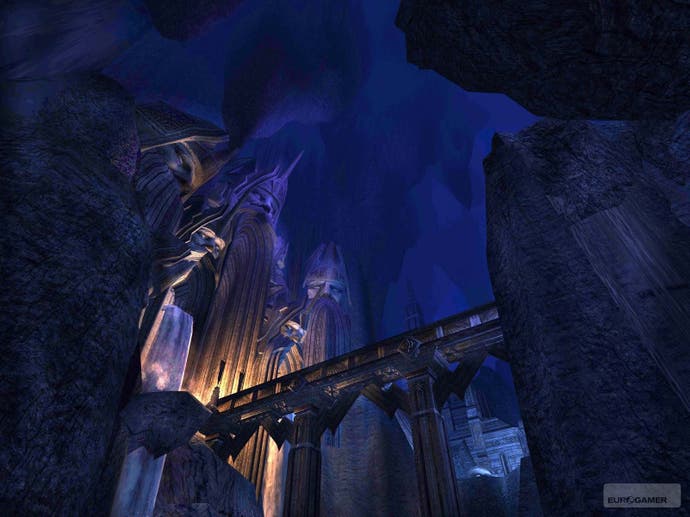
There are eight Traits per set, leaving some room for choice in your character build; and also a couple of spare Trait slots beyond the five for further customisation - Turbine points out that many players may eschew the Legendary Trait in favour of a sets of four and three. An advantage of this simple system over standard talent trees is that Turbine can introduce new Traits and sets at will, and it's considering doing so in future updates.
Turbine is less forthcoming on the remaining changes in Mines of Moria at the moment. The new crafting guilds will take the tradeskill-inclined down particular specialisation paths using a reputation system. Turbine is promising to make far greater use of its "session play" style where players can take jump out of their own characters' skins for a while to play as a great hero (or villain, or chicken) of Middle-Earth. Although there no word of new Monster Play battlegrounds yet, the Ettenmoors is being thoroughly reworked; monster classes will be tweaked, an automatic system introduced to balance conflicts by buffing the weaker side, as well as new hot-spot and artefact-based objectives.
Mines of Moria might only make a quiet splash when it's released in a few months time, drowned out by the noisy heavyweight clash between Warhammer Online and the next World of Warcraft expansion, Wrath of the Lich King. But Lord of the Rings Online shouldn't be underestimated; it's the quiet success story of MMOs, profitable, smoothly run, elegant, polished and brimming with good ideas. Subscribers won't be surprised to learn that this expansion is no exception; the only trouble is getting that message out to everyone else.


